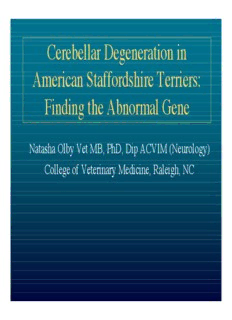
Cerebellar Degeneration in American Staffordshire Terriers: Finding the Abnormal Gene PDF
Preview Cerebellar Degeneration in American Staffordshire Terriers: Finding the Abnormal Gene
Cerebellar Degeneration in American Staffordshire Terriers: Finding the Abnormal Gene Natasha Olby Vet MB, PhD, Dip ACVIM (Neurology) College of Veterinary Medicine, Raleigh, NC What is Cerebellar Abiotrophy? • Neurodegenerative disorder affecting a part of the brain called the cerebellum • Also called cerebellar ataxia, cerebellar degeneration • There is a similar group of diseases in humans called - the hereditary ataxias - the spinocerebellar ataxias (SCA) What is the cerebellum? • Part of the brain that controls rate, range and force of movements Back of Nose head Signs of Cerebellar Disease • Ataxia: incoordinated gait characterized by ‘hypermetria’ - overstepping. Signs of Cerebellar Disease • Wide based stance • Intention tremor • Nystagmus (uncontrolled flicking of the eyes) Diseases of the Cerebellum • Congenital anomaly - a malformation of the brain that is present from birth • Encephalitis - infection or inflammation of the brain • Brain tumor • Stroke • Toxicity - metronidazole at high doses • Neurodegenerative disease (abiotrophy) Diagnosis of Cerebellar Diseases • Accurate history • Careful physical & neurological examination • Blood work, measurement of blood pressure, examination of the back of eye (fundic examination) • Chest radiographs (older animals) Diagnosis of Cerebellar Diseases • Imaging of the brain - CT or MRI – Will diagnose brain tumors, congenital anomalies, and in the case of MRI, stroke and degenerative diseases Diagnosis of Cerebellar Diseases • CSF analysis - spinal tap – Will allow the clinician to diagnose encephalitis – Performed under general anesthesia What do we know about CA in dogs? • It has been reported in multiple breeds, usually with onset of signs at an early age. • Five breeds have a later onset disease – Brittany spaniel – Gordon Setter – Old English Sheepdog – American Staffordshire terrier – Scottish Terrier
Description: